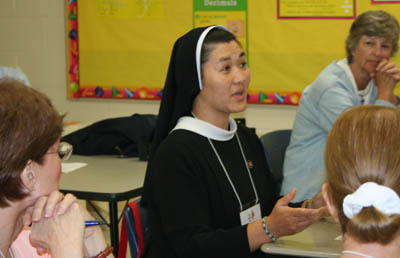
 HILTON HEAD — Catholics have a special relationship with Jesus that can be discovered and nurtured through exploring the beauty of the Eucharist, by reading sacred Scripture and sharing the Gospel with others.
HILTON HEAD — Catholics have a special relationship with Jesus that can be discovered and nurtured through exploring the beauty of the Eucharist, by reading sacred Scripture and sharing the Gospel with others.
That was the focus at the biannual Fire at the Beach conference, held Sept. 18-19 at St. Francis by the Sea Church.
The event drew 351 people from 58 parishes around the Diocese of Charleston, plus visitors from North Carolina and Georgia. Attendees included priests, men and women religious and lay people, with ages ranging from college students and young adults to senior citizens.
The two-day conference provided opportunities for group prayer and fellowship, including a concert on Sept. 18 by the Festival Chorus from St. Gregory the Great Church in Bluffton. There also was a special “Theology on Tap” discussion session held in the cafeteria of St. Francis School.
Fire at the Beach started Sept. 18 with an opening prayer session and keynote speech from Marcus Grodi, founder of the Coming Home Network and host of the Eternal Word Television Network weekly series, “The Journey Home.” His theme was “The Verses I Never Saw.” Grodi discussed his journey from life as a Protestant pastor through conversion to Catholicism, and described how his conversion enabled him to see verses of Scripture and the meaning of the Eucharist in a completely new light.
“For many converts to the church, particularly clergy converts, often one of the avenues to discovery of the Catholic faith is the rediscovery of Scripture,” Grodi said. “I recognized that certain Scriptures made a whole lot more sense from the Catholic perspective than they did from some of the Protestant traditions.”
Grodi cited 1 Timothy 3:15 as an example. The verse described “the church of the living God, the pillar and support of the truth.”
“This shows that the pillar and foundation of truth is the church itself,” he said. “Before I became Catholic, I would have thought the pillar was the Bible. My conversion awakened me.”
He also used the example of Thessalonians 2:15, which emphasizes the need to recognize church tradition passed down through the ages in both spoken and written words.
On Sept. 19 Grodi gave a workshop on “Keeping Our Kids Catholic.” He described the challenges of raising children who hold onto Catholic, Christian values in an increasingly secular and hostile culture, and offered several tips on how parents can raise children who will stay faithful to the church. He said one of the most important things parents must do is first “make sure we are Christians.”
“That may seem ridiculously obvious, but it is easy to look like a faithful Catholic and not be a true Christian, not know Jesus,” Grodi said. “When we have a faith of externals, it’s easy to think that if I’m doing these things, I’m a good Christian and a good Catholic. Jesus becomes just a word. We need to remember that apart from Jesus, nothing about our faith makes any sense. For instance, Mary only makes sense in the context of Jesus.”
He said parents must also stay true to Catholic teachings, talk about the positive aspects of their faith and constantly pray for their children as they grow up and go out into the world.
Saturday’s keynote speaker was Janet Smith, who focused on “Self-Giving Love: The Eucharist and the Theology of the Body.” Smith is a philosopher, theologian and author who is a consultor to the Pontifical Council on the Family and holds a chair of life ethics at Sacred Heart Major Seminary in Detroit.
Smith’s focus was on how Christ’s relationship to his people through the Eucharist can be compared to the relationship between bride and groom in marriage. She said that in the same way as marriage is meant to be a complete union between man and wife, with the sacred goal of bringing new life into the world through marital union, Christ seeks to be in complete union with his people, and to help bring them to fullness of life through his forgiveness and love.
“As the bridegroom loves his wife, so Jesus loves each and every soul as his precious bride,” Smith said. “Christ nourishes the church with his body through the Eucharist. Most spouses don’t realize that through their marriage, they’re symbols of Christ’s love for his church, which is his bride.”
Smith also presented a workshop on how secular culture, which has a distorted view of personal freedom, contributes to the growth of anti-life phenomenon in the world, such as contraception, abortion and assisted suicide.
Margaret Nutting Ralph, an author and teacher on the subject of Scripture, gave two workshops about how Scripture offers the basis for Catholic beliefs about the Eucharist and how to read Scripture for understanding.
Sister Pamela Smith, of the Sisters of Sts. Cyril and Methodius, presented a workshop on “Eucharist, Care and the Problem of Pain,” which focused on responding to suffering as people of faith. She is the diocesan director of catechesis and Christian initiation.
Sister Pam noted that many people respond to suffering with questions such as “Why me?” and “How could God let this happen?” She stressed that the Catholic Christian response involves focusing on Christ’s suffering and his sacrifice for us, represented through the Eucharist.
Other workshops during the weekend focused on ways to nurture vocations and welcome immigrants and newcomers, spread the word about Catholicism through the Internet, develop strong catechesis in local parishes, and come together for fellowship by forming small Christian communities.
